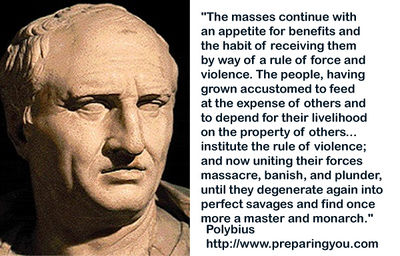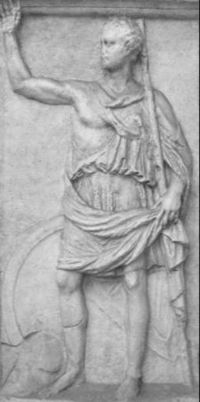Polybius

Polybius was born around 200 BC in Arcadia. He was a Greek deported to Rome as a son of someone who opposed Roman rule in his own country, Macedonia. In Rome Lucius Aemilius Paulus employed him to tutor his two sons. He eventually placed his allegiance with the Roman Republic.
Polybius believed all democracies fail.
"The masses continue with an appetite for benefits and the habit of receiving them by way of a rule of force and violence. The people, having grown accustomed to feed at the expense of others and to depend for their livelihood on the property of others... institute the rule of violence; [1] and now uniting their forces massacre, banish, and plunder,[2] until they degenerate again into perfect savages and find once more a master and monarch." [3] Polybius saw the downfall of the republic a 150 years before the first Emperor of Rome and 175 years before the birth of Jesus Christ and John the Baptist.
The authoritarian State uses force and violence to become the Benefactors of the people. They force one class of citizen to provide for another. Proverbs 23 warned and Christ forbid that type of government.
Real Christians of the early Church had actually repented and were diligently seeking the kingdom of God and His righteousness by the practices of pure religion according to the perfect law of liberty. Since most modern Christians are under a strong delusion about the reality of their faith in Christ and what it should mean they find themselves back in the bondage of Egypt and often workers of iniquity.
The solution of the early Christian community was to not pray to the Fathers of the earth for their free bread and benefits which are a snare but to set the table of the Lord through the Eucharist of Christ which was a daily ministration established by His Church through faith, hope, charity and the perfect law of liberty in the practice of Pure Religion.
If you need help:
- Or want to help others:
Join The Living Network of The Companies of Ten
The Living Network |
Join Local group |
About |
Purpose |
Guidelines |
Network Removal
Contact Minister |
Fractal Network |
Audacity of Hope |
Network Links

Polybius wrote The Histories which provided a detailed account of Rome's ascent as an empire. It included his eyewitness account of the Sack of Carthage in 146 BC by one of his former pupils.
He helped organize the new governments in Greece after their destruction.
He set the standards for honest historians influencing the historian like Sempronius Asellio.
Polybius was widely read by Romans and Greeks alike.
He is quoted extensively by Strabo explaining causes of events rather than just recounting events. He is mentioned by Cicero and Diodorus, Livy, Plutarch and Arrian. Montesquieu
Polybius gained a following in Italy, with men like Niccolò Machiavelli but also in French, German, Italian and English. His popularity among the learned public with such men as Isaac Casaubon, Jacques Auguste de Thou, William Camden, and Paolo Sarpi
Polybius' political thoughts inspired republican thinkers like Charles de Montesquieu and the Founding Fathers in America.
John Adams, considered him one of the most important teachers of constitutional theory.
Jose Ortega y Gasset calls Polybius "one of the few great minds that the turbid human species has managed to produce", and says the damage to the Histories is "without question one of the gravest losses that we have suffered in our Greco-Roman heritage".
- “There is no witness so dreadful, no accuser so terrible as the conscience that dwells in the heart of every man.” ― Polybius
- “If history is deprived of the Truth, we are left with nothing but an idle, unprofitable tale.”― Polybius, The Rise of the Roman Empire
- “In our own time the whole of Greece has been subject to a low birth rate and a general decrease of the population, owing to which cities have become deserted and the land has ceased to yield fruit, although there have neither been continuous wars nor epidemics...For as men had fallen into such a state of pretentiousness, avarice, and indolence that they did not wish to marry, or if they married to rear the children born to them, or at most as a rule but one or two of them, so as to leave these in affluence and bring them up to waste their substance, the evil rapidly and insensibly grew.”― Polybius, The Histories, Vol 6: Bks.XXVIII-XXXIX
- “At the sight of the city utterly perishing amidst the flames Scipio burst into tears, and stood long reflecting on the inevitable change which awaits cities, nations, and dynasties, one and all, as it does every one of us men. This, he thought, had befallen Ilium, once a powerful city, and the once mighty empires of the Assyrians, Medes, Persians, and that of Macedonia lately so splendid. And unintentionally or purposely he quoted---the words perhaps escaping him unconsciously---
- "The day shall be when holy Troy shall fall
And Priam, lord of spears, and Priam's folk."
- "And on my asking him boldly (for I had been his tutor) what he meant by these words, he did not name Rome distinctly, but was evidently fearing for her, from this sight of the mutability of human affairs. . . . Another still more remarkable saying of his I may record. . . [When he had given the order for firing the town] he immediately turned round and grasped me by the hand and said: "O Polybius, it is a grand thing, but, I know not how, I feel a terror and dread, lest some one should one day give the same order about my own native city.”― Polybius
- “Can any one be so indifferent or idle as not to care to know by what means, and under what kind of polity, almost the whole inhabited world was conquered and brought under the dominion of the single city of Rome, and that too within a period of not quite fifty-three years?”― Polybius, The Histories
- “They want the centurions not so much to be venturesome and daredevils, as to be natural leaders, of a steady and reliable spirit. They do not so much want men who will initiate attacks and open the battle, but men who will hold their ground when beaten and hard-pressed, and will be ready to die at their posts.”― Polybius
- “From this I conclude that the best education for the situations of actual life consists of the experience we acquire from the study of serious history. For it is history alone which without causing us harm enables us to judge what is the best course in any situation or circumstance.”― Polybius, The Rise of the Roman Empire
- “The order of battle used by the Roman army is very difficult to break through, since it allows every man to fight both individually and collectively; the effect is to offer a formation that can present a front in any direction, since the maniples that are nearest to the point where danger threatens wheels in order to meet it.”― Polybius
- “There is no witness so dreadful, no accuser so terrible, as the conscious that dwells in the heart of every man.”― Polybius
- “The particular aspect of history which both attracts and benefits its readers is the examination of causes and the capacity, which is the reward of this study, to decide in each case the best policy to follow. Now in all political situations we must understand that the principle factor which makes for success or failure is the form of a state's constitution: it is from this source, as if from a fountainhead, that all designs and plans of action not only originate but reach their fulfillment.”― Polybius, The Rise of the Roman Empire
== Footnotes ==
- ↑ Matthew 11:12 And from the days of John the Baptist until now the kingdom of heaven suffereth violence, and the violent take it by force.
- ↑ Luke 16:16 The law and the prophets [were] until John: since that time the kingdom of God is preached, and every man presseth into it.
- ↑ "But when a new generation arises and the democracy falls into the hands of the grandchildren of its founders, they have become so accustomed to freedom and equality that they no longer value them, and begin to aim at pre-eminence; and it is chiefly those of ample fortune who fall into this error. 6 So when they begin to lust for power and cannot attain it through themselves or their own good qualities, they ruin their estates, tempting and corrupting the people in every possible way. 7 And hence when by their foolish thirst for reputation they have created among the masses an appetite for gifts and the habit of receiving them, democracy in its turn is abolished and changes into a rule of force and violence. 8 For the people, having grown accustomed to feed at the expense of others and to depend for their livelihood on the property of others, as soon as they find a leader who is enterprising but is excluded from the houses of office by his penury, institute the rule of violence; 9 and now uniting their forces massacre, banish, and plunder, until they degenerate again into perfect savages and find once more a master and monarch" Polybius: The Histories (composed at Rome around 130 BC)Fragments of Book VI, p289